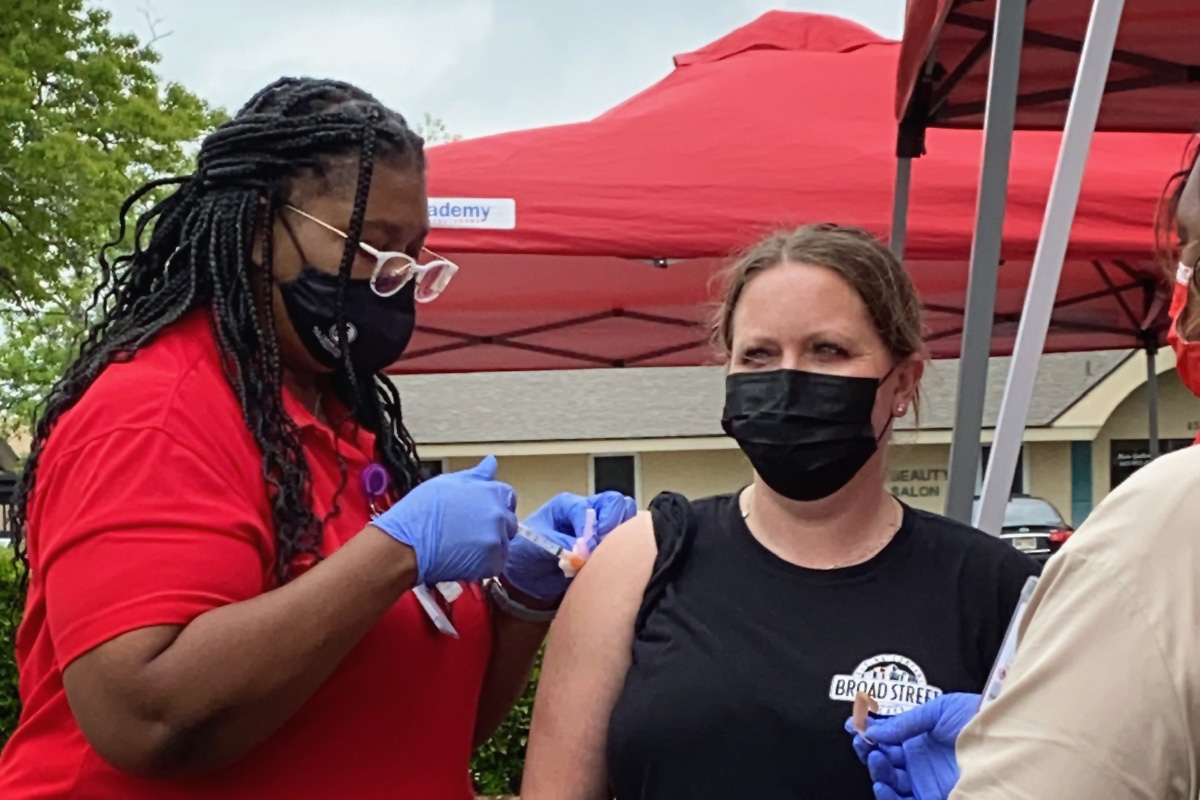Two weeks after a temporary, nationwide halt on the use of the Johnson & Johnson COVID-19 vaccine, the Mississippi State Department of Health is encouraging health-care providers to continue delivering the single-shot vaccine, with an advisory for women under 50 to consider using Pfizer or Moderna’s formulation.
At a Wednesday press event, State Health Officer Dr. Thomas Dobbs confirmed initial reports that the blood clots that triggered the pause were extraordinarily rare in the vaccinated population.
“The vaccine was associated with a very small number of rare blood-clotting disorders. … The number of cases that they had identified after additional research was 15 … out of 7 million or so doses of the Johnson & Johnson vaccines administered,” Dobbs said.

He continued, comparing the complication to the broader consequences that COVID-19 causes. “(The blood clots) are a relatively narrow risk window, about 1.9 per million. In the 25 to 39 age group, the risk of death (from COVID-19) is 1.9 per 1,000. So we’re seeing several orders of magnitude difference in risk,” Dobbs finished.
The state health officer’s numbers translate to a thousand times greater risk of a young adult dying from COVID-19 than getting a blood clot from the vaccine.
Still, MSDH is recommending all Mississippi health-care providers inform women younger than 50 about the rare risk of blood clots, as well as offering alternative vaccines, including the Pfizer and Moderna two-shot mRNA vaccines.
MSDH Survey Finds Unique Results
In addition to restarting usage of the Johnson & Johnson Vaccine, MSDH released the results of its vaccine demand study, examining the interest in—and resistance to—the vaccine across the state.
Director of Preventive Health and Health Equity Dr. Victor Sutton shared the results of the study at the afternoon press event.

“We had over 11,000 Mississippians read the survey, and we had representation in all the counties,” Sutton said. He added that the majority of those who had taken the survey were women, but that the racial makeup of survey respondents had been diverse.
Some of the key findings: “We found that 73% of Mississippians indicated they would definitely like to receive the COVID vaccine. This breakdown changed as it relates to race and ethnicity.” Only 10% of Mississippians surveyed outright rejected the idea of getting vaccinated, with the remaining 17% of respondents in the “vaccine hesitant” category.
Sutton summarized the results, finding that vaccine intent declined most precipitously for the state’s Black residents, 56% of whom declared their intent to get the vaccine. White and Asian Mississippians, Sutton said, shared an affirmative interest at an 80% rate, with Hispanic Mississippians at 61%.
Men were more interested in the vaccine than women, with 78% of men declaring their intent to get vaccinated compared to 68% of women.
Notably, Sutton said MSDH’s surveys found no significant variation between political affiliations on the subject of vaccine intent. “Those who identified themselves as independent, those who identified themselves as Republican, and those who identify themselves Democrats … we didn’t see a big change in that.”
An NPR/PBS/Marist survey from March found different results than MSDH’s study, displaying no significant variation between white and Black respondents. The same survey found significantly more resistance to the vaccine among self-described Republican respondents: just under 50% of Republican men asserted that they did not intend to get vaccinated in that study.
Sutton told the Mississippi Free Press that dissimilarities between MSDH’s survey and the national results could have to do with the way the questions were asked, or the type of respondents polled. “We looked at some of the national surveys, (compared to the) survey that we conducted and we found that there were a lot of similarities,” he said.
“We did a really rich grassroots outreach to various populations. 11,000 is a huge number that we reached … So some of the methodology could’ve been a little different,” he said.
MSDH looked for solutions to vaccine hesitancy in their study, finding that the most effective avenue for convincing shot-averse Mississippians to get vaccinated would be the encouragement of their primary-care providers. “Of surveyed Mississippians,” the study reads, “Of surveyed Mississippians, 23.6% of COVID-19 vaccine hesitant Mississippians would likely get the COVID-19 vaccine if their regular primary medical care provider encouraged them to do so.”
The study also indicates that the process of vaccinating the state’s young population will take additional effort. Despite the fact that 73% of Mississippians personally intended to get vaccinated, MSDH’s survey found that, “[o]verall, of all surveyed parents, 52.2% of Mississippians intend to vaccinate their children for COVID-19.”
Vaccine Numbers Growing, But Sluggishly
MSDH also responded to troubling slowdowns in the number of vaccines delivered week after week in the month of April.
Dobbs suggested slowdowns were eventually inevitable, as the most eager populations receive their second dose and MSDH transitions into reaching more hesitant populations, less likely to immediately sign up for a shot.
The state health officer told the Mississippi Free Press that demand, not access, would determine the future of the vaccine effort. “It’s not an access issue,” he said. “There are more access points than there ever have been.”
State Epidemiologist Dr. Paul Byers put the numbers in context. “Seventy percent of Mississippi individuals 75 and older have at least one dose of COVID-19. That’s a huge step towards protecting the hospital system and the lives of the most vulnerable to complication and death from the virus,” he explained.

With significant numbers of the most vulnerable Mississippians already vaccinated, many of the remaining targets for achieving herd immunity are the state’s younger residents, for whom the virus is dangerous, but not as deadly.
Byers suggested that most Mississippians receiving the mRNA vaccines, which require two shots either three or four weeks apart, are getting both of their doses, but promised to examine the percentage of Mississippians who skip their second dose.
“Right now, (of) the individuals who have received at least one dose of Pfizer or Moderna, 81% of them have received their second dose,” Byers said, cautioning that this number includes the many thousands of people still waiting for their second shot to come due.
The state epidemiologist stressed that any Mississippian who missed their second shot, even by weeks or months, should still come back and finish their Pfizer or Moderna vaccination.
Homebound COVID-19 Vaccinations
MSDH is pursuing the state’s harder-to-vaccinate population with a series of home visits and pop-up vaccination sites across the state. Sutton celebrated the health agency’s community partnerships as a last-mile solution for smaller communities around the state.
“We launched the partnerships with our community health centers around the state (as well as) other partners: if anyone wants to have a community vaccination event, we’re open to it and willing to partner with them,” Sutton said, adding that the state health agency had already coordinated events with many small institutions and even living complexes around the state.
We have partnered with apartments, faith-based organizations, community health centers, elected officials, to bring in the vaccine to your doorstep and bring it into the community. That is where we are now. And this is going to be a key component.”
In addition, MSDH announced homebound vaccination services, for individual delivery of vaccines to Mississippians who cannot leave their homes. Interested residents or guardians should reach out to the state health agency at COVIDhomebound@msdh.ms.gov for more information.






